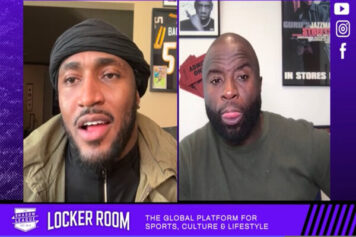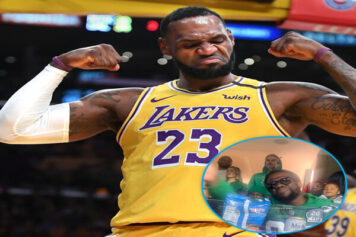But, let this be a true statement about professional sports for any of you who may ever be considering it. Professional sports is a profession. The owners are never going to be in love with you. Never. Theyre in it to make money and youre in it to make money and never the twain shall fully meet. Bill Russell.
***
As the official start of NBA free agency loomed, you knew it was coming.
LeBron James was going to decide his basketball future, change the landscape of the NBA, and break the internet, all at the same damn time. And thats just what happened on July 1, when he announced he was heading to the Lakers.
The King, as he likes to be called, has that much power. Hes seemingly his own industry, calling all the shots. Over the last decade, with his short-term deals, no trade clauses and player options, he changed how basketball players navigate their futures.
While King James sits on the throne, it is important to note that he descends from a long lineage of black athletes that have fought to gain power in a white controlled industry.
Carpool Karaoke: The Series – LeBron James & James Corden
In this extended preview, James Corden asks LeBron James about hearing his name in rap songs and LeBron sends his buddy Jay Z a text, all before Ice Cube jumps in the car to sing “It Was a Good Day.” Sign up for Apple Music and watch the entire episode tonight at http://applemusic.com/carpoolkaraoke.
Its a history that includes jockey Isaac Murphy demanding more pay at the Southern raceways, Jim Brown being the first football player to have an agent, Venus and Serena Williams boycotting the Indian Wells Valley tennis tournament for fourteen straight years to protest racism, and Colin Kaepernick and other protesting players forcing white billionaire owners onto the field to take part in protests.
Black athletes were not meant to have power in sports. They have had to take it.
***
Since their ascension, black pro athletes have battled for their rightful share in a sports industry that tried to exploit their bodies and extract as much money from them as possible, while giving them little say in the process.
Colin Kaepernick Will Be Amongst The Greats Like Tommie Smith, John Carlos & Peter Norman
Remembering the 1968 Olympics and how these men stood up for our people then and now. Colin Kaepernick will go down in history as a man who demanded change for his people just like Tommie, John and Peter. Nicole’s View “Tip Jar”: https://www.paypal.me/NLewis372
At the turn of the 20th century, in prizefighting, the one sport where black men were allowed to have a sizable presence, white managers and promoters refused to negotiate with black fighters, managers, or promoters. Black fighters had little power to negotiate a fair price and often found themselves ripped off by white promoters and managers.
This put the black athlete in a terrible bind; if he wanted to make a living, he had to play by their racist rules. But he had one move to play; the fighter controlled his body. He was the show. And understanding that point allowed him to chip away at the power structure.
While heavyweight champion Jack Johnson fired his white managers at will and negotiated his own terms for his fights with a take it or leave it attitude, other fighters like Sam McVey and Sam Langford waited until that had a promoter in the hole, as the 1913 quote suggests, and withheld their services to extract more money. Their insistence on getting theirs, however, irritated the white power structure. Still does.
Jack Johnson: Unforgivable Blackness | PBS America
JACK JOHNSON: UNFORGIVABLE BLACKNESS – 9pm, Saturday 21 & Sunday 22 December on PBS America (Virgin Media 243 & Sky 534) ** As part of Ken Burns’ Season ** Broadcast over two evenings, Ken Burns’s film tells the story of one of the greatest boxers of all time and his refusal to accept the rules of a society that considered him a second-class citizen.
Ask Bernard Hopkins. Ask Floyd Mayweather. Promoters, managers, and the media mocked them for their assertions to get their right share. To the white power structure, black athletes had no business talking business.
***
Right or wrong, I took it to mean, As one Great White Father to Another Great White Father this is what well do for this dumb Negro boy who unfortunately doesnt understand the language too well. Bill Russell
The post-World War II integration of professional sports added a new, but now, tired trope: the black athlete should be grateful for merely having an opportunity to make money playing a game.
Believing that the black athlete should be grateful for having an opportunity to play for pay, owners and general managers often belittled black athletes. Theyd often ignore them altogether when it came time to negotiate a contract. After all, owners reasoned, where did the black athlete have to turn?
The black athlete that wanted to gain power was forced to put his dignity first. Bill Russell learned this while trying to negotiate a contract with the Harlem Globetrotters. As the college senior sat down to negotiate his future, the white men in the room did all the talking. The representative for the Globetrotters didnt even speak to the future Hall of Famer. Instead, he talked to Russells assistance coach.
NBA Vintage: Bill Russell
We take a dive into our archives with NBA Vintage as it looks back on the career of Bill Russell. About the NBA: The NBA is the premier professional basketball league in the United States and Canada.
As a proud black man, Russell didnt play that. He walked away from the deal. Although he took less money, when he signed with the Celtics, he kept his dignity. Five years later, he was the highest paid athlete in the league. As a black man, in a white controlled sport, he knew the score. He refused to concede any power. He refused to play by the racist unwritten rules that said a black man he should be grateful. Sports was a business, and he deserved his.
He broke it down like this; They say, You have a big earning capacity. Youve had more breaks than most Negroes. And I tell them to go to hell. Because I know the reason I have what I have is that I have the ability. Nobody said, Heres a nice little Negro boy I should give a break to. They say, Heres an athlete who can help us. Thats what they pay me for. That and nothing else.
Soon, others would follow is lead.
***
If I am greedy, I learned from you. – Oscar Robertson
Increasingly, black athletes learned to think like white owners. They had to get greedy. Before the advent of free agency, athletes in team sports had few options. For most, it was sign the contract or find a new job.
But as professional sports started to rely more on black talent, star athletes increasingly tried to take more power. Like the black boxer before him, the baller realized he was the show.
In 1965, when Oscar Robertson negotiated a new contract with the Cincinnati Royals, he demanded $100,000, a cut of the gate and to see the receipts. When the Royals tried to play him, and offered him the same contract he had the previous year ($60,000,) he told the team he had other options. Hed quit if they werent willing to give him his rightful share.
They talk about basketball being a sport, Robertson told the local press, But its a business with me. Sure, Id like to continue playing with the Royals. Ive enjoyed it here and at [the University of Cincinnati]. But Im going to play wherever I can make my money.
Area 21: Oscar Robertson on How He Changed the NBA | Inside the NBA | NBA on TNT
How Oscar Robertson changed the NBA forever, and how that’s affected the league globally.
Five days before the season started, they gave Oscar his money. While he only received $70,000 guaranteed, the Big O also received a cut of the gate. That also meant he got to see the receipts. Something few athletes, before or since, get to see.
***
A well-paid slave, is nonetheless a slave. – Curt Flood
Curt Flood changed the game when he risked it all. The great centerfielder-activist athlete, refused to play their game.
In 1969, when the St. Louis Cardinals traded him to the Philadelphia Phillies without even asking, he said no.
Flood wanted an end to the reserve clause.
Until the advent of free agency, if a team drafted or signed a player, the team held the players contract perpetually. This not only violated labor laws, but as Flood insisted, it violated his human rights.
As he told commissioner Bowie Kuhn, After twelve years in the Major Leagues, I do not feel that I am a piece of property to be bought and sold irrespective of my wishes. I believe that any system which produces that result violates my basic rights as a citizen and is inconsistent with the laws of the United States and of the several States.
BASEBALL: A Film by Ken Burns–Late 1960s and Curt Flood
Curt Flood discusses his initial challenge to baseball to earn free agency.
When the Cardinals and Major League baseball refused to heed to his demands for dignity, he sued the league. Although he lost his court case in the Supreme Court, and essentially lost his career battling baseball, his fight paved the way for free agency in sports, thus giving athletes the ultimate power.
***
I want to maximize my business. And if I happen to get it, if I happen to be a billion-dollar athlete, ho. Hip hip hooray! Oh, my God, Im gonna be excited. – LeBron James
Over the last decade, no athlete has seized more power in sports than LeBron James. Even when hes seemingly taking less, hes grabbing more.
Flanked by his childhood friends and now business partners, Maverick Carter, Rich Paul, and Randy Mims, who Knicks GM Phil Jackson once derogatorily labeled as his posse, James has turned the NBA into his personal chess board.
Lebron James’ First NBA Game (INCREDIBLE)
Lebron James First Career NBA Game Highlights vs The Sacramento Kings In 2003. Incredible Performance http://boingvert.com/hoop Facebook:https://www.facebook.com/houseofhoopsyoutube Twitter: https://twitter.com/HouseOfHoops1 The NBA is the premier professional basketball league in the United States and Canada. The league is truly global, with games and programming in 215 countries and territories in 47 languages, as well as rosters that currently feature 85 international players from 36 countries and territories.
His short-term deals, for example, gave him the power to force teams to bend to his will. Get the team right, or else. This year, when the Cavs whiffed on key trades and refused to improve the lineup, he left for the Lakers and extended his throne to Los Angeles, where hes poised to make his mark on and off the court and approach that billion-dollar goal.
LeBron is the lineage of the black athletes wildest dream. He is a product of their struggle. He is Jack Johnson. He is Bill Russell. He is Oscar Robertson. He is Curt Flood.
They played their role, so he could take control the board.



